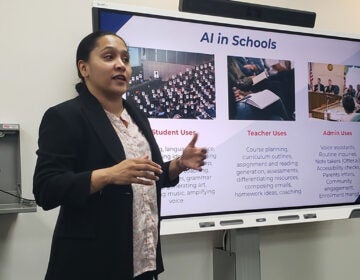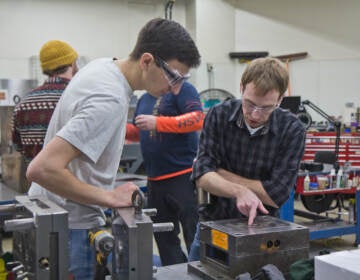Coming this fall: On-campus students, virtual classes
Several Philly area universities are planning virtual classes while still inviting students back to campus. A Penn prof says schools can't justify that hybrid approach.
Listen 17:15
Many Philadelphia-area universities have introduced a hybrid model for the fall, bringing students onto campus but still having them do most of their coursework remotely. (lakshmi Prasad/Bigstock)
Several colleges and universities in the Philadelphia region plan to hold mostly online classes this fall, while still inviting some students to come back to campus — including the University of Pennsylvania, West Chester and Temple.
While many educators are pushing back against teaching in-person, Penn professor Jonathan Zimmerman joins us to unpack his argument that schools can’t justify that so-called hybrid plan, which he says won’t eliminate the health risks or give students the college experience they’re paying for.

Hear the whole story on The Why
Interview highlights
On the history of remote learning
Starting in the 1930s, we introduced radio classes and then after the second World War, especially with the influx of students through the G.I. Bill, we had educational television. Later, we had so-called teaching machines, which were sometimes called program learning, and eventually we had computers and the internet. And in each of these instances, the technology’s cool, what was to widen what today would be called access. So to take the second World War example, suddenly you have literally millions of new students flooding into the system. By 1947, half of the college students were G.I.s. And the universities are appropriately concerned about whether they’re going to be able to teach these masses, as they were called. And so … the idea was use a machine to provide this education to a wider array of people.
What I think is so unique about our moment since March is that everyone has had to learn via the machine. That’s what I think is different about our moment. I think historically the machines had been for newcomers to the system, and often for people with less privilege. So pre-COVID, who did most of the online instruction learning? It was a community colleges and it was it for-profit colleges. It wasn’t at Harvard and at Penn.
On inviting students back to campus without in-person classes
For some institutions, especially smaller private schools, there’s obviously a fiscal crunch and imperative here. Room and board fees are very important to the bottom line of those institutions. And I think a lot of them are afraid that they won’t be able to survive unless they actually collect those fees. I would say with the very elite schools, that’s probably less of an issue, although it still is one. I would say the other thing that’s going on with all the schools is, you know, the students want to go back. They don’t want to be at mom and dad’s house any more than I would have wanted to be when I was 19 years old. And I think there’s definitely a market imperative here. I think that the customer, as it were, the students, they also want those services like they want to be back with their peeps, back in the dorms, in the gyms and libraries. And my question is, if that’s where they’re going to be, why aren’t they also in the classroom?
On whether the pandemic will accelerate the trend of online learning
What we did in America is we constructed this thing called the college experience. And for a lot of people, it’s been quite central to the allure of the institution. This goes back to why we’re bringing students back, right? Because they love college. That doesn’t necessarily mean they love my class. They love being at college. They love the fact that you have all of these young people thrown together in an extremely small space. And I think that one of the big questions going forward is what’s the value of that? What is the value not just of having students in the same room, but having, say, 4,000 students in the same square mile? That’s been the historic pattern, the “classic college experience.” But let’s also remember that almost half of American students now are community college students, and almost none of them are residential. We’re going to have to ask not just what’s the value of in-person instruction, but what’s the value of the in-person college period?
WHYY is your source for fact-based, in-depth journalism and information. As a nonprofit organization, we rely on financial support from readers like you. Please give today.






